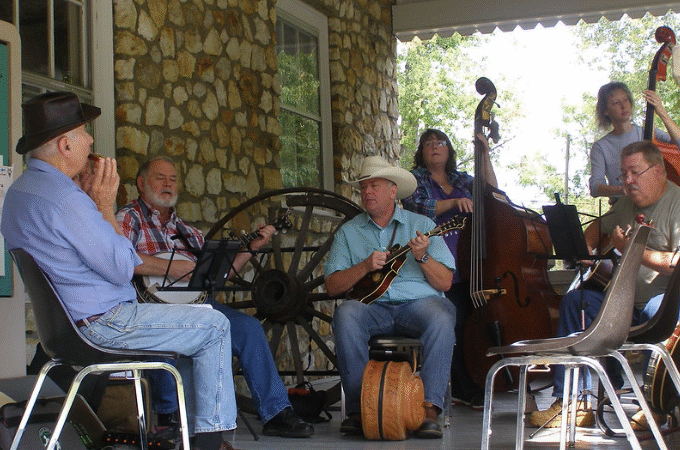Are you an oikophile or an oikophobe?
Conservative philosopher Roger Scruton (1944-2020) coined these two words from the Greek oikos, meaning household, home, or place. But Scruton broadened this meaning to include culture. Accordingly, oikophiles are those who love their homes and the culture passed down through generations. Oikophobes may love their private homes, but disdain, or even despise, the cultural inheritance handed to them from the past.
In Scruton’s wordplay we find one of the fundamental explanations for our present-day political divisions.
A recent visit to North Carolina’s Waynesville, a town in the Great Smokies, convinced me once again that I’m in the oikophile camp. Here I lived from 1984 to 2006, operating a bed-and-breakfast, a bookstore, and a homeschool book company. Until her death in 2004, my wife and I raised four children in this town, homeschooling them, volunteering as leaders in Girl Scouts and Cub Scouts, involving our children in soccer and baseball, and taking them to church and youth groups. Our family loved the rambling old house where we lived and rented rooms to guests. We were a part of the community, threw New Year’s Day parties for family and friends, and celebrated our culture, primarily through what we taught our children. My brief visit confirmed my long-lasting affection for Waynesville and all it meant to my family.
At two other times in my life, I’ve experienced this love of place, culture, and family: my childhood in the small town of Boonville, N.C., and the last five years or so my current town. In Boonville, we knew everyone from the barber to the pharmacist to the grocer. In my current town, our vibrant Catholic church, teeming with children and newborns, bestows a similar sense of community.
In his article, “To Love and Preserve,” Lars Moller provides an excellent overview of Scruton’s thoughts on oikophilia and what he considered its opposite, “the culture of repudiation.” Moller writes of Scruton, “He argues that our civilization is under threat from those who forget or reject the past — whether through radical politics, cultural amnesia, or architectural brutalism.”
Scruton was a particularly harsh critic of modernist architecture with its dehumanizing concrete and glass uniformity, and for decades such architecture and the other elements mentioned above have eaten away at our culture.
Erin Doom includes several long excerpts from Roger Scruton in his article “Scrutonian Oikophilia,” One of these nicely sums up Scruton’s philosophy.
Oikophilia leans naturally in the direction of history and the conservation of the past: not from nostalgia, but from a desire to live as an enduring consciousness among things that endure. The true spirt of conservation sees the past not as a commercialized ‘heritage,’ but as a living inheritance, something that lasts because it lives in me. To exist fully in time is to be aware of loss and to be working always to repair it. It is to listen as ‘Footfalls echo in the memory/Down the passage which we did not take/Towards the door we never opened/Into the rose garden.’ The past lives in us as a place of untaken pathways, of decisions and commitments, and it is by experiencing the world thus that we acquire the sense of stewardship. We come to see that this present moment is also past, but the past of someone else, who has yet to be.
Doom neatly sums up these thoughts this way: “Home. The people in our home. The surrounding settlement. History. Conservation of the past. The past as a living inheritance.”
In other words, if we are to preserve these things, that means we must love them, know them, and repair them when necessary.
There are any number of measures we can take to do so. We can make our homes places of beauty, welcoming both to us and to guests. We can strive as well to make them places of retreat, where spouses and children treat one another with respect and kindness, and feel safe. We can cut back our online purchases and shop locally. We can volunteer in our communities, or show up for local activities, like Independence Day concerts or Christmas parades. We can make sure our young people are well-acquainted with America’s past and the history of the West, and are thereby able to pass along our cultural heritage to the next generation.
Do these things, and the next time someone asks about your politics, you can proudly proclaim, “I am an oikophile!” That ringing declaration will either leave your questioner in a stumped silence or give you a great opening to explain the beauty and nobility in the love of place and particulars.
—
The republication of this article is made possible by The Fred & Rheta Skelton Center for Cultural Renewal.
Image Credit: Flickr-Melinda Young Stewart, CC BY-NC-ND 2.0
28 comments















28 Comments
Elisa Switzer
August 28, 2025, 5:16 pmJOIN US Everybody can earn 250/h Dollar + daily 1K… You can earn from 6000-12000 Dollar a month or even more if you work as a part time job…It’s easy, just follow instructions on this page, read it carefully from start to finish… It’s a flexible job but a good earning opportunity. tab for more detail thank you……..
REPLYJust join This Website ——-⫸ https://Www.EarnApp1.Com
Deloris Ayton@Elisa Switzer
August 28, 2025, 5:17 pmGoogle paid $200 a hour on the internet..my close relative has been without labor for nine months and the earlier month her compensation check was $51005 by working at home for 10 hours a day….. Everybody must try this job now by just use this
GOOD LUCK.:)
𝒋𝒖𝒔𝒕 𝒖𝒔𝒊𝒏𝒈 𝒕𝒉𝒊𝒔 𝒔𝒊𝒕𝒆
REPLY——-⫸ https://Www.HighProfit1.Com
OlgaHJenkins@Deloris Ayton
August 31, 2025, 5:41 amI get paid more than $120 to $130 per hour for working online. I heard about this job 3 months ago and after joining this i have earned easily $15k from this without having online working skills. This is what I do…….Www.Works6.Com
REPLYOlgaHJenkins@Deloris Ayton
August 31, 2025, 5:41 amI get paid more than $120 to $130 per hour for working online. I heard about this job 3 months ago and after joining this i have earned easily $15k from this without having online working skills. This is what I do…….Www.Works6.Com
REPLYJimbeau@Deloris Ayton
August 31, 2025, 8:50 amI get paid over 220 Dollars per hour working from home with 2 kids at home. i never thought i’d be able to do it but my best friend earns over 15k a month doing this and she convinced me to try. it was all true and has totally changed my life. This is what I do, check it out by Visiting Following Website…
REPLY.
.
HERE—————⊃⫸ https://Www.Cash43.Com
RSLewis@Deloris Ayton
August 31, 2025, 8:51 amGoogle is now paying $300 to $500 per hour for doing work online work from home. Last paycheck of me said that $20537 from this easy and simple job. Its amazing and earns are awesome. No boss, full time freedom and earnings are in front of you. This job is just awesome. Every person can makes income online with google easily….
REPLY.
More Details For Us→→ http://Www.Payathome9.Com
illiana@Elisa Switzer
August 29, 2025, 11:55 amJOIN US Everybody can earn 250/h Dollar + daily 1K… Y You can earn from 6000-12000 Dollar a month or even more if you work as a part time job…It’s easy, just follow instructions on this page, read it carefully from start to finish… It’s a flexible job but a good eaning opportunity.tab for more detail thank you……..
For details check ——-⫸ http://www.join.money63.com
REPLYCarolyntello@Elisa Switzer
August 29, 2025, 2:37 pmI have made $300 reliably in one day!**That was my ideal day in my life and my boss was to a great degree content with me..CNN is additionally awed from my work and is outstandingly happy**Want the secret?** Copy this Website and choose HOME TECH OR MEDIA…
COPY THIS→→→→ Www.CartBlinks.Com
REPLYCarolyntello@Elisa Switzer
August 29, 2025, 2:41 pmI have made $300 reliably in one day!**That was my ideal day in my life and my boss was to a great degree content with me..CNN is additionally awed from my work and is outstandingly happy**Want the secret?** Copy this Website and choose HOME TECH OR MEDIA…
COPY THIS→→→→ http://Www.CartBlinks.Com
REPLYMichelle R. Danner
August 29, 2025, 6:19 amI have just received my 3rd payment order and $30,000 that I have built up on my laptop in a month through an online agent…!v76) This job is good and his regular salary is much better than my normal job. Work now and start making money online yourself.
REPLYGo here….… https://Www.Smartpay1.site
Jessie H. Roberts
August 29, 2025, 12:43 pmCash generating easy and fast method to work part time and earn an extra $15,000 or even more than this online. By working in my spare time I made $17990 in my previous month and I am very happy now because of this job. you can try this now by following
REPLYthe details here…… https://Www.Smartpay1.site
Alice
August 29, 2025, 1:35 pm"My friend told me about service.richjob2.com and honestly I’m happy I gave it a try. Even in my free time it feels like I’m doing something useful."
REPLYStacey A. Botts
August 29, 2025, 1:56 pmReal on the web h0me based work to make more than $14k. Last month I made $15738 from this home job. Very simple and easy to do and procuring from this are just awesome . For more detail
REPLYvisit the given interface.. https://Www.Jobs99.site